-
Philosphical PoemsALL THAT LIES BETWEEN
Energy is a beauty and a brilliance,
Flashing up in its destructance,
For everything isn’t here to stay its “best”;
It’s merely here to die in its sublimeness.
Like slow fires making their brands, it breeds,
Yet ever consumes and moves on, as more it feeds,
Then spreads forth anew, this unpurposed dispersion,
An inexorable emergence with little reversion,
Ever becoming of its glorious excursions,
Bearing the change that patient time restrains,
While feasting upon the glorious decayed remains
In its progressive march through losses for gains.
We have oft described the causeless—
That which was always never the less,
As well as the beginnings of our quest,
And too have detailed in the rarest of glimpses
The slowing end of all of forever’s chances.
So now we must now turn our attention keen
To all of the action that exists in-between—
All that’s going on and has gone before,
Out to the furthest reaches, ever-more,
For everything that ever happens,
Including life and all our questions,
Meaning every single event ever gone on,
Of both the animate and the non,
Is but from a single theme played upon.
This then is of the simplest analysis of all,
For it heeds mainly just one call—
That of the second law’s dispersion,
The means for each and every occasion,
From the closest to the farthest range—
That which makes anything change.
These changes range from the simple,
Such as a bouncing ball resting still,
Or ice melting that gives up its chill,
To the more complex, such as digestion,
Growth, death, and even reproduction.
There is excessively subtle change as well,
Such as the formations of opinions tell
And the creation or rejections of the will,
And yet all these kinds of changes, of course,
Still become of one simple, common source,
Which is the underlying collapse into chaos—
The destiny of energy’s unmotivated non-purpose.
All that appears to us to be motive and purpose
Is in fact ultimately motiveless, without purpose.
Even aspirations and their achievement’s ways
Have fed on and come about through the decay.
The deepest structure of change is but decay,
Although it’s not the quantity of energy’s say
That causes decay, but the quality, for it strays.
Energy that is localized is potent to effect change,
And in the course of causing change it ranges,
Spreading and becoming chaotically distributed,
Losing its quality but never of its quantity rid.
The key to all this, as we will see,
Is that it goes though stages wee,
And so it doesn’t disperse all at once,
As might one’s paycheck inside of a month.
This harnessed decay results not only for
Civilizations but for all the events going fore
In the world and the universe beyond,
It accounting for all discernible change
Of all that ever gets so rearranged,
For the quality of all this energy kinged
Declines, the universe unwinding, as a spring.
Chaos may temporarily recede,
Quality building up for a need,
As when cathedrals are built and formed,
And when symphonies are performed,
But these are but local deceits
Born of our own conceits,
For deeper in the world of kinds
The spring inescapably unwinds,
Driving its energy away—
As All is being driven by decay.
The quality of energy meant
Is of its dispersal’s extent.
When it is totally precipitate,
It destroys, but when it’s gait
Is geared through chains of events
It can produce civilization’s tenants.
Ultimately, energy naturally,
Spontaneously, and chaotically
Disperses, causing change, irreversibly.
Think of a group of atoms jostling,
At first as a vigorous motion happening
In some corner of the atomic crowd;
They hand on their energy, loud,
Inducing close neighbors to jostle too,
And soon the jostling disperses too—
The irreversible change but the potion
Of the ‘random’, motiveless motion.
And such does hot metal cool, as atoms swirl,
There being so many atoms in the world
Outside it than in the block metal itself
That entropy’s statistics average themselves.
The illusions of purpose lead us to think
That there are reasons, of some motive link,
Why one change occurs and not another,
And even that there are reasons that cover
Specific changes in locations of energy,
The energy choosing to go there, intentionally,
Such as a purpose for a change in structure,
This being as such as the opening of a flower,
Yet this should not be confused with energy
Achieving to be there in that specific bower,
Since at root, of all the power,
Even that of the root of the flower,
That there is the degradation by dispersal,
This being mostly non reversible and universal.
The energy is always still spreading thencely,
Even as some temporarily located density—
An illusion of specific change
In some region rearranged,
But actually it’s just lingering there, discovering,
Until new opportunities arise for exploring,
The consequences but of ‘random’ opportunity,
Beneath which, purpose still vanishes entirely.
Events are the manifestations
Of overriding probability’s instantiations—
Of all of the events of nature, of every sod,
From the bouncing ball to conceptions of gods,
Of even free will, evolution, and all ambition,
For they’re of our simple idea’s elaborations,
Although for the latter stated there
And such for that as warfare
Their intrinsic simplicity
Is buried more deeply.
And yet though sometimes concealed away,
The spring of all creation is just decay,
The consequence and instruction
Of the natural tendency to corruption.
Love or war become as factions
Through the agency of chemical reactions,
The actions being the chains of reactions,
Whether thinking, doing, or rapt in attention,
For all that happens is of chemical reaction.
At its most rudimentary bottom,
Chemical reactions are rearrangements of atoms,
These being species of molecules
That with perhaps additions and deletions
Then go on to constitute another one, by fate,
Although they sometimes only change shape,
But too can be consumed and torn apart,
Either as a whole or in part, so cruel,
As a source of atoms for another molecule.
Molecules have neither motive nor purpose to act,
Neither an inclination to go on to react
Nor any urge to remain unreacted;
So then why do reactions occur if unacted?
Molecules are but loosely structured
And so they can be easily ruptured,
For reactions may occur if the process energy norm
Is degraded into a more dispersed and chaotic form,
And so as they usually are constantly subject
To the tendency to lose energy, as the abject
Jostling carries it away to the surroundations,
Reactions being misadventure’s transformations,
It then being that some transient arrangements
May suddenly be frozen into permanences
As the energy leaps away to other experiences.
So, molecules are a stage in which the play goes on,
But not so fast that the forms cannot seize upon;
But really, why do molecules have such fragility,
For if their atoms were as tightly bound as nuclei,
Then the universe would have died, being frozen,
Long before the awakening of the forms chosen,
Or if molecules were as totally free to react
Every single time they touched a neighbor’s pact
Then all events would have taken place so rapidly
And so very crazily and haphazardly
That the rich attributes of the world we know
Would not have had the needed time to grow.
Ah, but it is all of the necessitated restraint,
For it ever takes time a scene to paint,
As such as in the unfolding of a leaf,
The endurations for any stepping feat,
As of the emergence of consciousness
And the paused ends of energy’s restlessness:
It’s of the controlled consequence of collapse
Rather than one that’s wholly precipitous.
So now all is known of our heres and nows
Within this parentheses of the eternal boughs,
As well as the why and how of it all has come,
And of our universe’s end, but that others become.
Out of energy’s dispersion and decay of quality
Comes the emergence of growth and complexity.
(The verse lines, being like molecules warmed,
Continually broke apart and reformed
About the rhymes which tried to be non intrusions,
Eventually all flexibly stabilizing to conclusions.) -
What is your understanding of 'reality'?I am interested to know what media you are working in. — Jack Cummins
Photoshop, Final Cut Pro, iclone …
I don't draw or paint anything; I just move parts around to make a scene.
See my Youtube channel for more pics in videos, some of which move…
https://www.youtube.com/channel/UCAqzcN340HXpDqHXmAy3SwA -
What is your understanding of 'reality'?I was summoned here from the Shoutbox. I heard there were lovely original drawings here… — Hanover
Here they are:

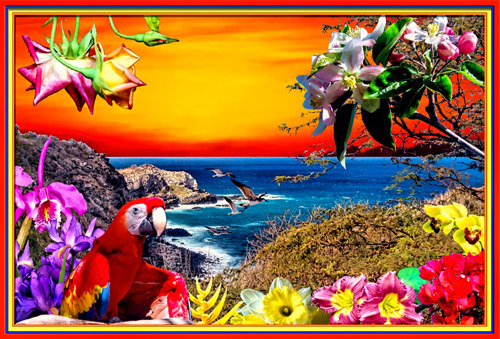
There was a time warp around you. -
What is your understanding of 'reality'?As much as I want the Moon to be made of Camembert, it just stubbornly stays a rock (as far as we can reasonably know). — hwyl
Well, but that's what happens to cheese when it gets left out! -
What is your understanding of 'reality'?Do you know who the artist is? — Jack Cummins
I am the artist. It depicts the level of reality of human being, based on the transitional past to future orthogonal to the oppositional matter and space, with the derivative pairings onward from that.
From ToE to HUMAN Being
Here’s the theory of how the Who of Being
Becomes of Existence’s Why and How,
Via the transitional Then to When
And the oppositional What and Where.
The Real’s Why is that Nothing cannot be;
Its How is that of Possibility,
Since all methods must be open, due to
The ‘IS’s never-birthed eternity.
Matter vs. Space, from the Formless ‘IS’,
Makes for the realm of appearances, which,
Since crossed by the passage of time, builds life’s
Pyramid from Movement-of-Appearances.
Past that was leads to Future that will be,
Transformational—‘Now’ in the middle,
Rolling smoothly, through recall, sensation,
And anticipation. Time is movement!
Space/Matter, oppositional, crosses,
From the Where/What top and bottom corners,
The left to right sweep of Past into Future,
Which is really as Then-into-the-When.
Where/What plus Then-to-the-When grows to blend
The Spirit of Life in the pyramid’s core,
After some more pairing relationships,
Subsequent, toward the life of our species.
Then+What is History—what has occurred,
While When+What will become Progress.
Then+Where begets Memory—remembrance,
While When+Where induces Wishes, as hopes.
Progress+Wishes combines into Vision;
Progress+History grants Change-in-Structure;
Memory+History makes for Learning;
Memory+History births Change-of-Outlook.
Change-in-Structure + Vision = Planning,
Change-in-Structure + Learning = Creating,
Change-of-Outlook + Vision = Growth;
Change-of-Outlook + Learning = Direction.
Finally, Planning, Growth, Creating,
And Direction make for Being’s Who.
( Matter vs. Space ) [Being] ( Past —> Future )
Five Forces
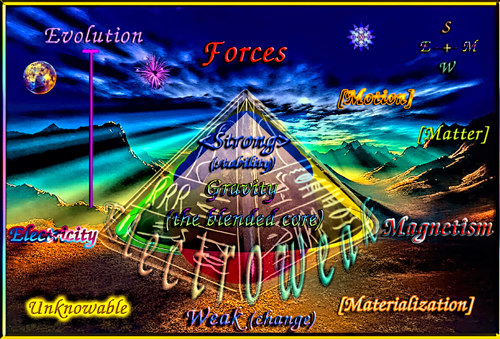
On the physical forces:
We note that two of them are transitional,
The Electric and the Magnetic,
Each giving rise to the other,
And that two others are oppositional,
The Weak and the Strong,
The Weak promoting changeability,
The Strong promoting stability.
Gravity is then left as the blend of all.
( Strong vs. Weak ) [Gravity] ( Electro <—> Magnetic )
At the molecule level, another oppositional
changeability/stability balance occurs since molecules
are neither inclined to stay together nor to break apart.
There is also 'patient' time restricting
energy's relentless changes from being precipitous.
Another depiction, with more in it:
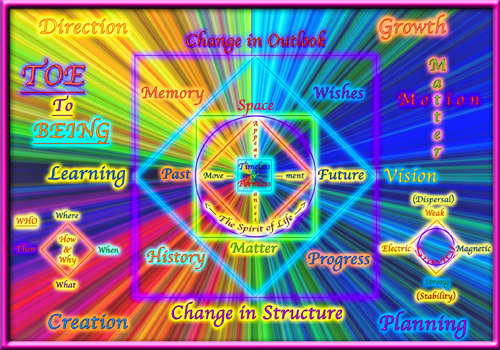
Provisional simple answers to the How and Why at a low level:
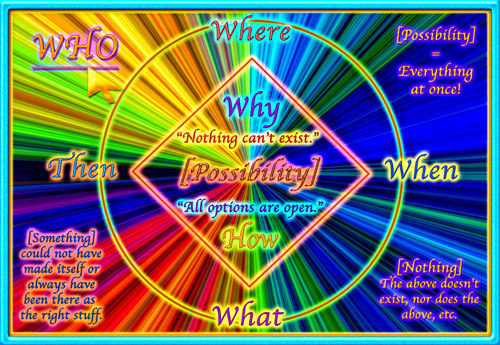
-
God Debristhe omnipotent God annihilated himself in the Big Bang to become the Universe. — CountVictorClimacusIII
An Absolute, such as 'God' cannot go away or have a beginning, or it wouldn't be Fundamental and 'First'.
Further, a Mind couldn't have been fundamental, for it would have parts necessarily more fundamental. -
What is your understanding of 'reality'?I have looked at your idea again, and I am sure that it has so much to argue in its favour, but the question which I would have is how could such an idea have for thinking about reality, in terms of living. — Jack Cummins
Yes, not much to be gained for living at the human being level, as either TOE is just simple, as it must be at that level, and so is not all that interesting but for obliterating some superstitions and demonstrating a kind of pointlessness.
Each level of reality gains its own set of new circumstances relevant to that level.
Our human level is where all the interesting action is, as we are very complex, although the universe is only about .02% along. We are still quite limited, as you note in another post, and will probably be looked upon as primitives by the higher human beings of the future, if we can even make it past becoming but a footnote of history by colonizing space and thriving on.
Our reality consists of all sorts of different minds and wills that have to do what they do, making for a kind of mass confusion but still providing for many interesting discussions.
Above all, experiencing life seems to feel quite rewarding, as the main benefit, if there are any, or at least a great consolation prize. -
What is your understanding of 'reality'?A question in a similar format would be why many things instead of just one, two, three or a handful? why are things that exist different from each other? — Daniel
Ah, a good clue, in what you said, plus adding to it: why the humongous amount of material in the universe, namely 2x10**76 particles or so (the '2' is for matter and antimatter)? Originally, there were 2x10**85 particles, but since there are a billion photons for every proton we had to take away 10**9 due to the annihilations of matter and antimatter in the early universe. Now all the material is far apart and so the annihilations are much less.
We have to conclude that material stuff was very easy to come by, this allowing for a lot of combinations leading to many differences.
At first there was mostly hydrogen, like 99%, before the rest of the atomic elements became to reduce the hydrogen result a few percent lower, but initially the other atomic elements were but traces of the simplest ones of lithium, helium, and, I forget, beryllium, maybe, until stars formed from protons by gravity, which produced perhaps 15 more of the atomic elements, but no more, for lack of the energy needed, until supernovae and/or colliding neutron stars produced the rest of the atomic elements. -
What is your understanding of 'reality'?I am just wondering to what extent can we rely on physics? — Jack Cummins
Well, in the case of QFT (Quantum Field Theory) and the Standard Model derived from it, we rely on its physics all the time, in all our myriad electron devices and more.
So, Philosophy works best when its derivations can get confirmed by/with science; otherwise, as we see in some of the forums, people say a lot of things that sound good on the surface, such as having 'free will', 'infinity', and 'Nothing' that quickly evaporates when delving into the definitions.
Science always questions, never stopping wondering, which is a lot better than having a philosophy that leaves all the questions out at the onset.
Seek out the clues… winnow the possible answers more… wishing and hoping doesn't do very much.
Why are all electrons exactly the same?
Why does just one electron or photon go through both slits in the experiment?
How come the complexity of humans becomes greater as we head toward the future, yet was simpler and simpler back into the past? Why would people claim the Greatest Complexity possible as First and Fundamental?
Why both matter and antimatter? Why the polarity of charge?
Why only two main particles (proton and electron) being stable in free space , with opposite charge (neutrons decay with in 12 minutes)? Why only one stable energy particle in free space, the photon, with neutral charge.
Anyone have more clues that can beget more real progress? -
What is your understanding of 'reality'?knowing absolutes — Jack Cummins
One begins with the true knowing of what proposed absolutes have fallen by the wayside:
Newton's proposed space and time as absolutes were given the boot by Einstein, so, they are but emergent, and not fundamental, so, the ultimate foundation can't have them.
Classical particles as spigots producing fields turned out to be mute and so they cannot be so as the fundamental loot. In addition, composites cannot be First, for their parts would have to be more fundamental than they, so composite particles, like atoms, are out, and thus are but secondary.
Quantum fields do fit the bill, for they are continuous and thus but only made of themselves, as non composite. Note that 'Nothing' cannot exist, nor even be meant, and so there can't be any spacers of 'nothing' in the fields, Einstein having already noted this continuity in "All is field".
What is left as a a candidate?
Quantum fields can be modeled as harmonic oscilators, which necessarily implies quanta of energy, such as in that an electron in an atom can only be at or only jump to certain quantum energy levels, so, the model is thus correct.
Before one asks how an Absolute can be made from no parts, note that Absolutes are ever, as eternal, and so they are neither breakable nor makable, having no beginning and no end.
One still wonders how they can just be there forever and never made, but, again, Something has to be, since there is undeniably something and and there could not have been 'Nothing'; thus Existence has no alternative. That we already have this necessity as truth obviates its Why; yet there can be no true paradoxes.
An electron, then, is an excitation ripple in the quantum electron field, kind of like a kink in a rope, as are the other so-called elementary particles.
These quantum fields in no time or space would have to be all atop one another, being not in a coordinate system. We have background independence! Their excitations didn't so much 'get quantized, but are the energy quanta.
Anything but the Absolute Permanent is thus temporary. We further note that not anything in particular remains but in an instant changes, adding to the notion that the Absolute is energetic; yet, the Absolute can never change, but the temporaries ever do.
Since their can be no design point for an absolute, since it has no beginning and thus no 'before' or 'outside', we might deduce that it could itself be not anything in particular, and thus an Everything, either in a linear way, as in presentism, or all-at-once, as in eternalism, both of which time modes would appear to be the same to us. We don't know the mode of time.
OK, so much for Absolutes, and how they would be, but can they be at all?
If not, there is Relationism, with no absolutes at all, the relations being all. Quantum entanglement suggest that everything is connected everything.
Wrap up:
'God', too, is out, as an Absolute, for a system of mind cannot be non composite.
'Nothing' ever tries to creep back in as a source, but note, say, if you want something from 'it' like that it divides into positives and negatives, there had to be a capability for this 'unstableness' and so because this is a something you didn't have a 'Nothing' in the first place as claimed.
Indeed, there appears to be an zero balance in the Cosmos, with the negative potential energy of gravity seeming to cancel out the positive kinetic energy of stuff… but for perhaps some quantum wavering as necessity prohibiting the definite quantum state of zero.
So, either way, as an Absolute or as Relationism, we we lean toward Everything being, yet soon learn another lesson, which is that the information content of Everything such as a Library of Babel containing very possible book, would be the same as that of 'Nothing': zero.
So, we have two TOEs in hand, and thus we are indeed very close to knowing. -
What is your understanding of 'reality'?I think that often the choice of words such as energy, spirit and God are preferred ways to referring to the ultimate underlying reality. — Jack Cummins
You are referring to a Fundamental Absolute.
Either there is an Absolute, such as quantum fields (see QFT), or there is Relationism, with no intrinsic properties or absolutes (see RQM), so, indeed, we are very close to knowing. -
A short theory of consciousnessConsciousness — Gnomon
What the meaning to this play we’re befit,
From dirt to dust within the script that’s writ?
The wise in search have thrown themselves to waste;
Experience alone is the benefit.
Physics describes but the extrinsic causes,
While consciousness exists just for itself,
As the intrinsic, compositional,
Informational, whole, and exclusive—
As the distinctions toward survival,
Though causing nothing except in itself,
As in ne’er doing but only as being,
Leaving intelligence for the doing.
The posterior cortex holds correlates,
For this is the only brain region that
Can’t be removed for one to still retain
Consciousness, it having feedback in it;
Thusly, it forms an irreducible Whole,
And this Whole forms consciousness directly,
A process fundamental in nature,
Or’s the brain’s private symbolic language.
The Whole can also be well spoken of
To communicate with others, as well as
Globally informing other brain states,
For nonconscious parts know not what’s being made.
…
Oh, those imaginings of what can’t be!”
Such as Nought, Stillness, and Infinity,
As well as Apart, Beginning, and End,
Originality, Free Will, and He. -
What is your understanding of 'reality'?Except for the unfortunate fact that Rovelli still maintains physicalism. — Wayfarer
His apparent 'physical' is woven from images in mirrors reflected by mirrors, is how I take his thinking, with no underlying material substance. We can still investigate phenomena. -
What is your understanding of 'reality'?Carlo Rovelli — Wayfarer
Nagarjuna (aka 'The Second Buddha) Ideas Confirmed by Quantum Theory Relationalism:
In his new book, 'Helgoland…', about Quantum Theory, Carlo Rovelli notes that All is Relational, that no entity exists independently of anything else, so that there are no intrinsic properties at all, but only 'properties' in relation to something else, which is essentially what Nagarjuna means by 'emptiness'.
Everything is 'quantum entangled' with everything, the 'things' more properly described as interactions and events.
Further, there are no fundamental substances, absolutes, no outside of Everything or bird's-eye view, no eternal basis, no 'God', etc. that is, there is no foundation of any kind to what goes on. 'Impermanance' goes all the way through…
This realization of 'Impermanence', 'No Absolutes' and 'Emptiness' is 'Nirvana'.
The quest is ended. -
Do Atheists hope there is no God?Do atheists actively not want God to exist? — Georgios Bakalis
That doesn't matter, for 'God' cannot exist. What is Fundamental cannot have parts. Not even something very simply composite can be First as the Absolute. -
What do you NOT knowwhat do you know — Thinking
The Answers to Everything
On What ‘IS’
(Particles as the energy excitations of quantum fields)
An Eternal Basis has to be so,
For a lack of anything cannot sow,
Forcing there to be something permanent,
As partless, from which composites can grow.
There can’t be other directions given,
To that which no start; it is undriven;
So, it is as Everything possible,
Either as linear or as all at once.
Consider quantum fields of waves atop
One another: waves are continuous,
And so qualifiy as Fundamental;
Quantized lumps make ‘particles’, then more.
The temp-forms last from unit charge or strength;
The Basis is coterminal with them,
But is not cosubstantial with the ‘things’;
The information content is the same as Null!
Note that there is no other absolute:
Newton’s fixed space and time got Einstein’s boot;
Particle spigots making fields went mute;
Classic fields had no fundamental loot.
… proposed …
There are no ‘if nots’ for happened events;
That would be a fantasy world but meant
For simulations and playing mind games—
No use entertaining real replacements.
On Consciousness
What the meaning to this play we’re befit,
From dirt to dust within the script that’s writ?
The wise in search have thrown themselves to waste;
Experience alone is the benefit.
Physics describes but the extrinsic causes,
While consciousness exists just for itself,
As the intrinsic, compositional,
Informational, whole, and exclusive—
As the distinctions toward survival,
Though causing nothing except in itself,
As in ne’er doing but only as being,
Leaving intelligence for the doing.
The posterior cortex holds correlates,
For this is the only brain region that
Can’t be removed for one to still retain
Consciousness, it having feedback in it;
Thusly, it forms an irreducible Whole,
And this Whole forms consciousness directly,
A process fundamental in nature,
Or’s the brain’s private symbolic language.
The Whole can also be well spoken of
To communicate with others, as well as
Globally informing other brain states,
For nonconscious parts know not what’s being made.
…
Oh, those imaginings of what can’t be!”
Such as Nought, Stillness, and Infinity,
As well as Apart, Beginning, and End,
Originality, Free Will, and He. -
Double-slit Experiment, The Sequeloh well, it was a world while it lasted. — Enrique
When You and I behind the cloak are past
But the long while the next universe shall last,
Which of one’s approach and departure it grasps
As might the sea’s self heed a pebble cast.
Or a stone skipped across a pond… -
Double-slit Experiment, The SequelYour mission if you choose to accept it: explain skipping a stone to me as temporary excitations of the permanent underlying quantum fields. — Enrique
Particles can be long-lasting as excitations due to their unit strength/charge as energy quanta…and from there we know the rest of the story. -
Double-slit Experiment, The SequelI would say that light isn't either a particle or a wave — Enrique
'Particles', as temporary excitations of the permanent underlying quantum fields, go through both slits because, well, as hinted, they are field quanta at heart. -
Monism or PluralismWhat is a whole, a One, without a boundary? — NOS4A2
This appears to be a problem, for the impossible 'Nothing' cannot be outside the One, making the One having to be of 'Infinite' extent, which is another problem, perhaps, since 'Infinite' is never complete and accomplished, leaving an impossible One, with all then being relative, if that's the right word. -
Monism or Pluralismour multiplex world — Gnomon
Speaking of complexity's progression, Julian Barbour as it that complexity is literally time, rather than of its opposite of disorder continuing on.
How it is that the higher minds of higher human beings will likely come about in the future if there is already a Highest Mind at the beginning? -
Monism or Pluralisman undivided singular eternal whole, but then, in order to create a complex space-time world from its own Substance, begins to divide into smaller parts, that add-up to complexity within unity — Gnomon
In physics, the well proposed multiplicity from unity is thought to be of covariant quantum fields' excitations acting as particles that, although secondary and temporary, can last last quite a while due to their quantum unit charge or quantum unit strength, and are thus then able to form more complexities, on up to minds. Seems that something in the unity needs to be responsible for what particular energy levels got chosen to make the 'particles' that would work or else they are the default. Each level seems to 'code' for the next one, from particles to a few atomic elements to stars to higher atomic elements to molecules to cells, to life, to consciousness. -
Is the material world the most absolute form of reality?whether the material world is the most absolute form of reality — Jack Cummins
I'm late here. The material world is not "absolute" in the sense of it being fundamental or permanent but it is as if it were to us since we are of it and in it as temporary and emergent events from the Absolute, many of which events are long lasting.
In physics, many of the earlier proposed absolutes have fallen, such as space, time, classical fields, and particles. All that's left so far are the proposed quantum fields of QFT that work fairly well for the standard model.
An electron, though secondary to its primary electron quantum field, holds together because it has the quantum unit of negative charge. It gets called 'elementary' since perhaps it is non-composite, I guess.
A proton, as a very long event, maybe lasting 10**35 years, is composite. Not anything composite can be the absolute base fundamental.
Yet, what 'realness' should we grant to our human reality, given that it becomes from the Absolute or is actually the Absolute at heart? Should we regard that the temporary transmutations of the Absolute are not the permanent Absolute itself? If so, then the Absolute is somehow coterminal with the goings on in our reality bust somehow not consubstantial with it. If not, we are the Absolute directly and change is intrinsic to the Absolute, which idea perhaps does not compute.
We see that everything changes continually at our level, as quick or slow events, although semblances continue, restrained by time from all happening and going away in a flash, leaving there to be not anything particular lasting here.
Coincidently, or relatedly, since the Absolute cannot have a beginning, it can't then be anything particular, as there is no point in time before it or outside it for any direction or design to be given.
Yet, we suppose covariant quantum fields, all atop one another, as they can work, given quantized energy (nothing else is quantized). The best we can say is that their base existence has no opposite, such as that 'Nothing' cannot even be meant, and so they have to be so, with no alternative.
Or they are forced, again because 'Nothing' cannot be. Yet, 'Nothing', or at least 'zero', seems to be the sum of our reality in that the negative potential energy of gravity exactly balances/cancels the positive kinetic energy of stuff. -
Nothingness and quantum mechanics.I have concluded that our world is not a random accident, but a product of Intention. — Gnomon
This is still a Mind as being First, aka 'God'.
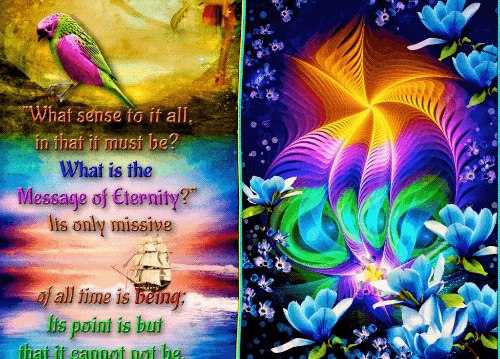
-
Nothingness and quantum mechanics.How can a wave propagate without some physical medium to compress & release? — Gnomon
All is field. The excitations are what we call 'particles'. From them, the, born of simplicity, the complex universe.
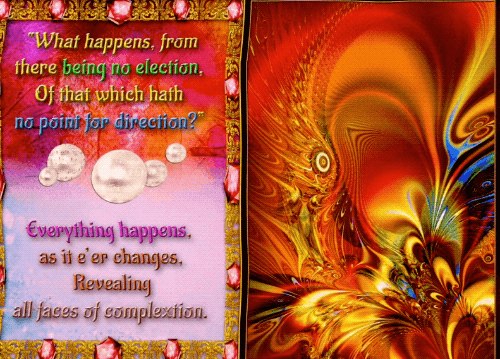
-
Nothingness and quantum mechanics.For any finite volume over any finite time interval, there is always a probability of field excitations. But even without those excitations, the field itself -- the potential for particles to emerge -- exists. 'Nothing' would suggest to me no such fields, not just no local excitations. It seems nonsensical to me to claim there are quantum mechanical arguments for this. — Kenosha Kid
The covariant quantum fields of Quantum Field Theory are what I favor as fundamental, for not only does the standard model work, as based on them, but also because they are non composite, made of only themselves. One cannot have a fundamental entity that is composite, for its parts would have to be even more fundamental.
So, then, much much less could a System of Mind wished for in a God Person be fundamental.
'Nothing' cannot even be meant. -
Nothingness and quantum mechanics.From what I understand from him these fluctuations are random. From his point of view they could not be anything else because that would require, as you say, an unbroken Cause of Causation. — Brett
Philosophically, they would be random, since there is no point before or outside of what is Eternal for input/design.
Scientifically, Anton Zeilinger claims to have shown that randomness is the bedrock of reality, to several sigma. -
Nothingness and quantum mechanics.
-
Duality in the universea union of opposites — Thinking
Yes, there's perhaps a deep union behind the balance of opposites, some even as a zero sum.
1. The negative potential energy of gravity matches/cancels the positive kinetic energy of stuff.
2. Two matter particles in free space, oppositely charged (another balance), the electron and the proton, and their antiparticles (another balance). Note that neutrons in free space decay in about 12 minutes. One energy particle, the photon, which is its own antiparticle or one could say it has none. Only those number of ways to make them in this curious symmetry, due to…?
3. The net electric charge of the universe appears to be zero.
More? -
A fun puzzle for the forums: The probability of GodA God would be a being that has the power and knowledge to create a specific universe. — Philosophim
'God' as a fun topic even beats out poor old Trump; a mere mortal can hardly compete with the Mysterious Fun-With-Da-Mental ways of the curiously invisible proposed Almighty.
Seriously, 'God', as the Fundamental Entity (as often dishonestly claimed to be truth), intentionaly thinks, plans, designs, and implements all that goes on, either utilizing just Himself, as the All, or by forming outside stuff and incorporating it within His All Encompassing Domain.
Surely, then this proposed 'God' Being is a system of mind; but, this Personhood isn't at all in favor of His being fundamental, for, as with any system, the parts would have to be even more fundamental. His probability falls, for what we do see happening is that beings such as ourselves evolved and if we are to evolve higher then this will happen in the future, which thus becomes the right direction to look in, not the past.
We see, indeed, that the deep and deeper past was of the simpler and simpler, unto continuous and partless covariant quantum fields whose quantized excitations are what we call 'particles'.
The Theory of 'God' is not a good one because it assumes a lot and shows nothing, for the 'Supernatural' that is supposed to be everywhere is ever AWOL. Good theories, like evolution, show a lot and assume practically nothing, such as the Standard Model / Quantum Fields which has plenty to show.
More to the point and more seriously… next time, through philosophy, science, and logic… this is just an intro. I have read all the posts. -
Logically ImpeccableActually as far as solipsism goes that is pretty much it. I think therefor I am. That's all, there is a reason it's called a dead end. — Darkneos
If Mind/Consciousness is the only Reality, R, as the Whole/Unity, then its message in our faux reality, r, as its essence/multiplicity/fragmentation is still that of ‘substance’ operating perfectly according to laws as if it were truly substance here.
While there would be no live band playing the Music of the Spheres due to the implementation/messenger of a kind of a recording/transmutation of R into r, via R, the result can be utilized the same, a difference that would seem to make no difference, albeit simulating r would seem to be a lot more complicated than if true substance in r did all the work itself.
It’s such that if I use an mp3 player the music is still the message, regardless of that messenger. -
Truth existsI think that's close. Interesting that it's a discovery of mathematical physics, isn't it? — Wayfarer
Yes, and it's incredibly close, for beyond its mathematical origin the precise predictions have been realized in experiments, and so the standard model came forth.
In this poem of analysis, we see how the other candidates gradually fell away:
— The Answers to Everything —
On What ‘IS’
(Particles as excitations of fields)
An Eternal Basis has to be so,
For a lack of anything cannot sow,
Forcing there to be something permanent,
As partless, from which composites can grow.
There can’t be other directions given,
To that which no start; it is undriven;
So, it is as Everything possible,
Either as linear or exists at once.
Consider quantum fields of waves atop
One another: waves are continuous,
And so qualifiy as Fundamental;
Quantized lumps are particles, then more.
The particles, etc., are temporary;
The Basis is coterminal with stuff,
But is not cosubstantial with the things;
Its information content is the same as Null!
Note that there is no other absolute:
Newton’s fixed space and time got Einstein’s boot;
Particle spigots making fields went mute;
Classic fields have no fundamental loot.
Proposed …
There are no ‘if nots’ for happened events;
That would be a fantasy world but meant
For simulations and playing mind games;
No use entertaining real replacements. -
Truth existsOne question I would ask is this: is there anything that exists that does not have a temporal beginning and ending (i.e. begins and ends in time) and is not composed of parts? — Wayfarer
Quantum fields, perhaps. -
The issue with atheism vs. theismOnly the intellectually dishonest state that 'God' or 'No God' is truth. Or, in Biblical, name-calling type language, only the fool says there is 'God' or 'no God'.
find common ground — Benj96
In general, whatever side assumes a lot is more suspect to not being fact. Strong theories assume very little, such as Evolution and thus show a lot of evidence. Attempted Disproofs can only be based on self-contradiction. Being agnostic seems quite reasonable. Getting off the Agnostic fence, as one must usually do in practice, in such as going or not to Church, can be based on probability.
The common ground would be that the All can be shown to have to be eternal. -
Do any philosophies or philosophers refute the "all is mind" position?To refute 'All is Mind', one needs to show that there is substance, which I'd say includes forces/energy acting as substance, plus that Mind cannot make substance, plus that there can't be a kind of a movie going on through Mind in which everything operates exactly as if there were substance and its laws, and that if there is this perfect movie going on that a difference in the message between the faux and the true substance is not a difference that makes no difference.
-
Anti-RealismA needle in a haystack — Michael McMahon
Back to your OP on that all is mind. The conceptualized mysteries ever baffle, not being able to be found in any haystack; they are led to, if your all-mind proposal is so, by Consciousness's fragmentation of the Whole that can be seen straight out by Awareness (the objectless kind). So, the smaller reality, r, would be the multiplicity formed by consciousness making distinctions, while the larger, real Reality would be the Unity.
To show mind to be all you might want to show that there is no real substance, 'Something', but still note that there cannot be 'Nothing', leaving mind as all.
For example, point 'particles' claimed by Physicists have no size/dimension, so then they cannot be substance. Look for more such cases. -
Anaxagoraswe'd have to say that it really wasn't random — Metaphysician Undercover
Some research somewhere I can't remember suggest that the wave function collapse isn't instant or random, it becoming only after a gradual build-up.
'Random', though has a tough time of going away, although I'd like it to. Anton Zellinger claims to have proven that "randomness is the bedrock of reality" to many sigma, through experiments. -
Anaxagoras"Natural Selection" — Gnomon
In the regular uncapitalized natural selection, it is the 'selection' that is the scientific alternate to ID, meaning, too, that evolution doesn't work by chance, which is the same as you said about chance not being able to drive it.
PoeticUniverse

Start FollowingSend a Message
- Other sites we like
- Social media
- Terms of Service
- Sign In
- Created with PlushForums
- © 2026 The Philosophy Forum








